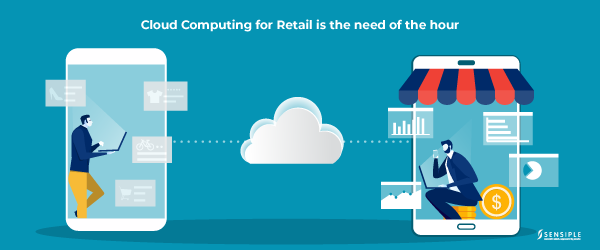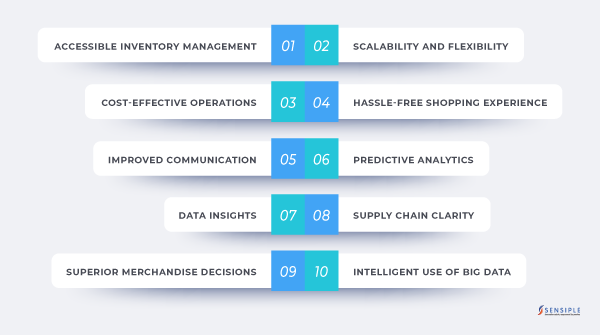Across the globe, retail industries leverage cloud solutions to drive their business growth and enhance operational efficiency. A recent study by Fortune Business Insights reported that the global retail cloud market held a revenue of $11.89 billion in 2018 and is anticipated to grow at a CAGR of 16.3% from 2019-2026.
With technology at the core of business operations, retailers have now recognized the importance of cloud computing to streamline workflows, reduce costs, manage supply chains more efficiently and provide customers with a better shopping experience.

Retail Cloud Computing Market Analysis
- The rise of e-commerce has exponentially increased the expectation of customized and enriched user experience while they shop
- According to the Global retail industry, more than 39.8% of organizations are increasing their overall ICT budget by 37.8%
Let’s dive further below to understand the impact of cloud computing solutions in the retail industry.
What are the benefits of Cloud Computing in the Retail Industry?

1) Accessible inventory management:
Most retailers solve their operational challenges with cloud computing. Inventory management is one of the most common challenges faced by retailers. They find it most challenging to manage multiple stores and keep accurate track of-time stock data. Retailers must have a well-structured inventory management process, and the cloud-based system will synchronize multiple store inventories under a single channel.
Cloud computing gives access to real-time data, analytics platforms, and cloud architecture for big retail companies to manage their stocks. Thus, cloud computing inventory updates and real-time data visibility make inventory management look seamless and simple.
Cloud computing has become a go-to solution for most retailers to address their operational challenges. One of the most pressing issues faced by retailers is inventory management, as it can be difficult to manage multiple stores and keep track of accurate stock data. In order to effectively manage their inventory, retailers need a well-structured process in place, and utilizing a cloud-based system can synchronize multiple store inventories under a single channel.
Through cloud computing, retailers have access to real-time data, analytics platforms, and cloud architecture that enable them to efficiently manage their stock. The ability to receive inventory updates in real-time and have visibility into data makes inventory management appear seamless and straightforward. Overall, cloud computing has become an essential tool for big retail companies to streamline their inventory management processes and ensure efficient stock control.
2) Scalability and Flexibility:
Cloud adoption in the retail industry offers a flexible solution for retailers to manage their computing usage with diverse pricing options. With cloud computing, retailers can easily handle unexpected situations and scale their operations more efficiently. The cloud-based model enables retailers to adapt to changing market conditions and respond to customer needs quickly while keeping costs under control.
3) Cost-effective Operations:
Cloud computing significantly reduces operations costs by saving money on operational expenditure budgets for software, hardware, and connectivity. With cloud computing, retailers can eliminate time spent on planning, development, and budget approval for capital expenditure, planning, and operations.
4) Hassle-free shopping experience:
Cloud computing in retail gives real-time data related to customers and their shopping details for delivering customized recommendations, coupon codes, memberships, and promotions. Customers can have access to stores 24*7.
5) Improved Communication:
Cloud Computing streamlines retailers with in-house and out-house communication across departments. There will be a significant reduction in miscommunications and improved collaboration across departments.
6) Predictive analytics:
Retailers will get expert insights into the supply chain, logistics, and inventory with the use of data analytics and data modeling. Cloud Computing in retail will help in predictive analysis to gauge the items in demand and assist in better supply chain decisions in real-time visibility.
7) Data insights:
Cloud computing centralizes structured and unstructured data from multiple sources, facilitating quicker data modeling and predictive analytics. With in-depth data visibility, retailers can drive more efficiency and performance-driven outputs.
8) Supply Chain clarity:
Cloud Computing in retail can enable retailers to handle the supply chain to their business without any stock-outs, high inventories, or accelerated deliveries. Retailers can capture the real-time status of the documents.
9) Superior Merchandise Decisions:
With the help of cloud computing, retailers can analyze customer behavior and buyer trends. Retailers can make superior merchandising decisions with the help of expert insights into customer preferences.
10) Intelligent use of Big Data:
Cloud computing helps retailers to use big data to enhance marketing techniques by determining the complete information on their customer persona and purchase history by capitalizing on big data through multiple sources to deliver a better customer experience.
How can Google Cloud Platform (GCP)help retailers?
Global retailers are reshaping their strategies to satisfy customers and stay ahead of competitors by delivering personalized experiences. Google Cloud can be a trusted technological ally to deliver a unique brand journeys for businesses. GCP makes AI or ML more accessible, with products and solutions extensively built for the retail industry.
Approximately seven out of ten leading retail and consumer packaged goods companies have modernized their businesses on GCP. The three prime areas where Google Cloud can benefit retailers are:
- Omnichannel growth: With Google Cloud, retailers can achieve a seamless shopping experience across different channels, including online and offline stores. Retailers can leverage GCP’s AI/ML capabilities to personalize the shopping experience for customers and provide targeted offers based on their purchasing history, browsing behavior, and preferences. Google Cloud also offers solutions for real-time inventory management, demand forecasting, and supply chain optimization, which help retailers ensure that products are available when and where customers need them
- Operational improvement: Google Cloud offers a range of solutions that can streamline and automate retail operations, such as supply chain management, inventory management, and order fulfillment. For example, retailers can use GCP’s machine learning capabilities to predict demand for products and optimize inventory levels, reducing the risk of overstocking or stockouts. Google Cloud can also help retailers improve the efficiency of their supply chain by providing real-time visibility into inventory levels and delivery status
- Customer-centric data: Google Cloud offers tools and solutions for retailers to collect, analyze, and utilize customer data to deliver more personalized experiences. Retailers can use GCP’s machine learning capabilities to analyze customer behavior, such as purchase history and online browsing patterns, to provide personalized recommendations and offers. Google Cloud also enables retailers to collect and analyze customer feedback from multiple channels, such as social media, email, and surveys, to gain insights into customer preferences and improve the overall customer experience
By associating with Google Cloud, retailers can have better-aligned solutions and AI/ML expertise and gain customer trust to deliver the best outcomes for the retail business.
Accelerate your journey to the cloud with Sensiple
Sensiple’s cloud services powered by GCP can deliver expert assistance to your retail business with migration and modernization solutions that optimize costs, modernize legacy apps, and cut operational burdens.
To know more about Sensiple’s solutions and services, contact us at info@sensiple.com.







